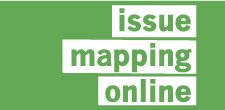Readings and Materials
Issue Mapping Readings & Materials
- Mauri, Michele, and Paolo Ciuccarellia. “Designing diagrams for social issues.” Design Research Society, Bighton, June 2016.
- Borra, E. & B. Rieder (2014) Programmed Method: Developing a Toolset for Capturing and Analyzing Tweets. Aslib Journal of Information Management, 66(3), 262-278.
- Borra, E., Weltevrede, E., Ciuccarelli, P., Kaltenbrunner, A., Laniado, D., Magni, G.. & Venturini, T. (2014, August). Contropedia: Mapping Societal Controversies with Wikipedia Contropedia-the analysis and visualization of controversies in Wikipedia articles. In Proceedings of The International Symposium on Open Collaboration (p. 34). ACM.
- Burgess, J., Galloway, A. and T. Sauter (2015) Hashtag as Hybrid Forum. In: Hashtag Publics, N. Ranbukkana (eds), London and New York: Peter Lang
- Marres, N. (2015) Why Map Issues? On Controversy Analysis as a Digital Method. Science, Technology & Human Values, 0162243915574602.
- Marres, N. & D. Moats (2015) Mapping Controversies with Social Media: The Case for Symmetry. Social Media + Society July-December 2015 vol. 1 no. 2 2056305115604176 Marres, N. & C. Gerlitz (2014).Interface Methods: Renegotiating Relations Between Digital Research, STS and Sociology. Sociological Review.
- Munk, A. (2014) Mapping Wind Energy Controversies
- Rogers, R., N. Sanchez-Querubin & A. Kil (2015) Issue Mapping for an Aging Europe, Amsterdam: Amsterdam University Press.
Related Platforms and Projects
- Tantlab Controversy Mapping Project
- Burgess, J., A. Bruns et al. Mapping Online Publics
- Benkler, Y. (2012) ‘Truthiness and the Networked Public Sphere’, Symposium on Truthiness in Digital Media, Berkman Centre for Internet and Society, Harvard University, March 6-7.
- Demoscience Teaching and research resource on Mapping Controversies
- Density Design: Controversy Analysis and Visualisation
- Govcom.org (2005) ‘The Places of Issues. Issue Crawler backend movie’, Making Things Public: Atmospheres of Democracy, Exhibition, ZKM Center for Arts and Media, Karlsruhe
- Latour, B. et al Mapping Controversies
- Risk Cartography: Internet based Argumentation Maps (Munich Institute for Social and Sustainability Research)
- The Tactical Technology Collective
Other Literature on Online Issue Mapping
- Gerlitz, C. and A. Helmond, ‘The Like economy. Social buttons and the data-intensive web’, New Media & Society, forthcoming.
- Marres, N. and E. Weltevrede (2012) ‘Scraping the Social? Issues in Real-time Research’, submitted to the Journal of Cultural Economy.
- Marres, N, and R. Rogers (2008) ‘Subsuming the Ground: How local realities of the Ferghana Valley, the Narmada Dams, and the BTC pipeline are put to use on the Web’, Economy and Society 37 (2): 251-281.
- Marres, N. and R. Rogers (2005) ‘Recipe for tracing the fate of issues and their publics on the Web’, In B. Latour and P. Weibel (Eds.) Making Things Public: Atmospheres of Democracy (Karlsruhe/Cambridge (Mass.): ZKM/MIT Press).
- Marres, N. (2004) ‘Tracing the trajectories of issues and their democratic deficits on the Web: The case of the Development Gateway and its doubles’, In: M. Berg, O. Hanseth and M. Aanestad (Eds.). Special issue on Actor-network Theory and Information Systems,Information, Technology and People 17 (2): 124-149.
- Marres, N and R. Rogers (2001) ‘Depluralising the Web and Repluralising Public Debate: The Case of the GM Food Debate on the Web’, Prefered Placement: Knowledge Politics on the Web (R. Rogers (Ed.)), Maastricht: Jan van Eyck Academie.
- Niederer, S., & van Dijck, J. (2010) ‘Wisdom of the crowd or technicity of content? Wikipedia as a sociotechnical system,’ New Media & Society 12(8), 1368 -1387. Rogers, R. and Marres. N. (2001) ‘Landscaping Climate Change: A Mapping Technique for Understanding Science and Technology Debates on the World Wide Web’, Public Understanding of Science 9 (141): 141-163.
- Rogers, R. and A. Ben-David (2010), ‘Coming to Terms: A conflict analysis of the usage, in official and unofficial sources, of ‘security fence,’ ‘apartheid wall,’ and other terms for the structure between Israel and the Palestinian Territories’, Media, Conflict & War 2 (3): 202-229.
- Rogers, R. (2010) ‘Mapping Public Web Space with the Issuecrawler’, in: Claire Brossard and Bernard Reber (eds.), Digital Cognitive Technologies: Epistemology and Knowledge Society. London: Wiley, 115-126.
- Thelwall, M., Thelwall, S. & Fairclough, R. (2006). Automated Web Issue Analysis: A nurse prescribing case study. Information Processing & Management, 42(6), 1471-1483. Venturini, T. (2010) ‘Building on Faults: how to represent controversies with digital methods’, Public Understanding of Science.
Social science literature on issue analysis
- Barry, A. (2005) ‘The anti-political economy’, In A Barry & D Slater (eds), The technological economy (London, Routledge): 84-95.
- Bloor, D. (1982) ‘Durkheim and Mauss Revisited: Classification and the Sociology of Knowledge’, Studies in History and Philosophy of Science 13 (4): 267–97.
- Boltanski, L. (1999) Distant Suffering: Morality, Media and Politics (Cambridge: Cambridge University Press).
- Callon, M., Lascoumes, P., and Barthe, Y. (2009) Acting in an Uncertain World. An Essay on Technical Democracy (Cambridge: MIT Press).
- Chateauraynaud, F. (2009) ‘Public controversies and the Pragmatics of Protest: Toward a Ballistics of collective action’, Working Paper EHESS, Paris. Downs, A. (1972) ‘Up and down with Ecology: the Issue Attention Cycle,’ The Public Interest 28: 38.
- Hilgartner, S. and Bosk, C. (1988) ‘The Rise and Fall of Social Problems: A Public Arena’s Model’. American Journal of Sociology 94: 53-78.
- Latour, B. (2005) ‘Introduction to Part 1: Learning to feed off controversies’, In Re-assembling the Social: An Introduction to Actor-Network Theory (Oxford: Oxford University Press): 20-26.
- Marres, N. (2007) ‘The Issues Deserve More Credit: Pragmatist Contributions to the Study of Public Involvement in Controversy’, Social Studies of Science 37, 5 (2007): 759-780.
- Yaneva, A. (2012) Mapping Controversies in Architecture (Farnham: Ashgate) Venturini, T. (2010) ‘Diving in magma: how to explore controversies with actor-network theory’, Public Understanding of Science 19 (3): 258-273.
- Whatmore, S.J. (2009) ‘Mapping knowledge controversies: science, democracy and the redistribution of expertise’, Progress in Human Geography 33(5): 587- 598.
- Wynne, B. (1996) ‘May the sheep safely graze? A reflexive view of th expert-lay knowledge divide’, In S. Lash, B. Szerszynski and B. Wynne (eds) Risk, Environment and Modernity: Towards a New Ecology (London: Sage).
